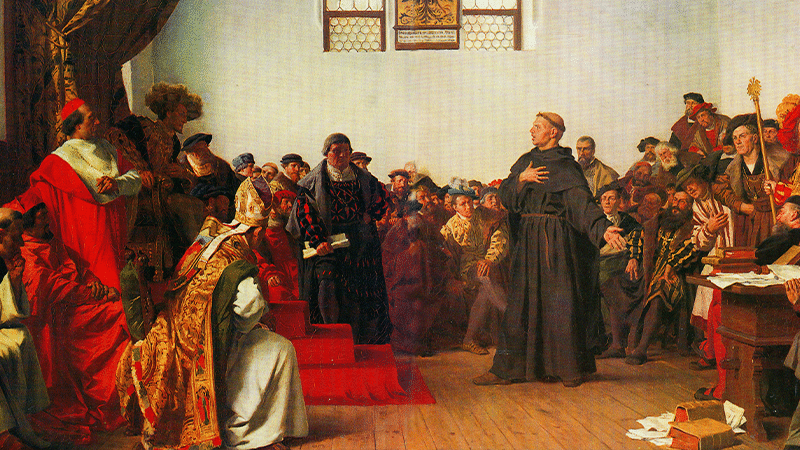Luther at the Diet of Worms

On 18 April 1521, Martin Luther made his stand for the supremacy of Scripture at the imperial assembly known as the Diet of Worms.
The German monk presented his case before more than two-hundred nobles and archbishops, headed by the Holy Roman Emperor, Charles V.
Luther had been excommunicated at the end of 1520. He responded by publically burning the papal bull of excommunication. Calls for his condemnation were led by one of the Pope’s ambassadors, Hieronymus Aleander. But while the Emperor was unsympathetic to Luther’s arguments, the powerful German prince, Elector Friedrich ‘the Wise’, insisted that the reformer should be given a hearing. And so it was set that at the next Imperial assembly, or ‘Diet’, he would be brought before the meeting at Worms in the west of what is now Germany.
‘Christ helping me’
Luther’s friends feared that he would not return. One hundred years earlier, Jan Hus had been denied his promised safe-conduct at the Council of Constance and burned at the stake for stating biblical truth. But Luther was firm: “Even if the Emperor calls me to Worms in order to kill me, or to declare me an enemy of the Empire, I shall offer to come. With Christ helping me, I shall not run away, nor shall I abandon God’s Word in this struggle.”
With Christ helping me, I shall not run away, nor shall I abandon God’s Word in this struggle
The proceedings were led by Dr Johann von Eck, official of the Archbishop of Treves. Luther was asked just two questions: were the pile of books before him his, and would he recant of the doctrines within them?
Luther acknowledged authorship, but requested a day to consider his second answer, and spent much of the night in prayer seeking God’s help.
‘Captive to the Word of God’
Responding the next day, he refused to recant unless he could be convinced from the Bible. Eck then challenged Luther once more if he would recant his teachings, leading to the reformer’s famous words:
“Unless I am convinced by the testimony of the Holy Scriptures or by evident reason – for I can believe neither pope nor councils alone, as it is clear that they have erred repeatedly and contradicted themselves – I consider myself convicted by the testimony of Holy Scripture, which is my basis; my conscience is captive to the Word of God. Thus I cannot and will not recant, because acting against one’s conscience is neither safe nor sound. God help me. Amen.”
my conscience is captive to the Word of God
Uproar ensued and proceedings were called off. Three more days failed to persuade him to change his stance.
‘Supremacy of the Word of God’
With no possibility of Luther recanting, Charles cancelled any further proceedings and sent him back to Wittenberg. Within a month, he had declared him an outlaw of the Empire; Luther’s life was now in danger.
But by this point, he had been rescued by the forces of Elector Friedrich ‘the Wise’, who staged a fake ambush in order to provided him a safe haven. It was here that Luther worked on translating the Bible into German, completing the New Testament in 1522 and the Old Testament twelve years later.
Church historian Philip Schaff summarised accordingly: “Luther’s testimony before the Diet is an event of world-historical importance and far reaching effect… He stood there as the fearless champion of the supremacy of the word of God over the traditions of men, and of the liberty of conscience over the tyranny of authority.”
The Diet proved to be a turning-point for Christianity in Europe. It saw God’s Word found in Scripture magnified and vindicated in the face of serious opposition. Following 1521, many more reformation movements sprung up, sparking new fires of evangelical fervour in Germany and beyond.
